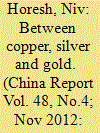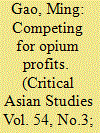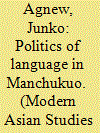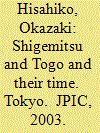|
|
|
Sort Order |
|
|
|
Items / Page
|
|
|
|
|
|
|
| Srl | Item |
| 1 |
ID:
117609


|
|
|
|
|
| Publication |
2012.
|
| Summary/Abstract |
This article provides the first comparative overview in English of Japanese colonial banks before World War II with an emphasis on their roles as banks of issue in Taiwan, Korea and Northeast China. It discusses at length similarities and differences in these banks' note circulation patterns, in their note-reserve requirements and their actual application, and in their geographical spread and respective colonial mandates. There was some variation in Japanese bank note issuance in the colonial setting of Korea and Taiwan, in 'Manchukuo' and in those parts of China that remained nominally sovereign. But all Japanese colonial banks seem, in one way or another, to have astutely adjusted the spread of their note issue in order to control for flagging demand due to nationalist boycotts, or to conversely cash in on demand spurts for notes resulting from crises in the indigenous financial sector. The banks of issue under review here were theoretically subject to a 100 per cent reserve requirement, but the make-up of their metallic bullion reserve and the degree of their notes' convertibility were very dissimilar, reflecting varying local conditions. Both in terms of reserve ratios, and note denominations-the banks prudently followed charter obligations that were devised by the Japanese Treasury but, at the same time, were reminiscent of the obligations that British overseas banks also had to abide by. Thus, the findings discussed here shed light on the inception and adaptability of Japanese colonial policy in the lead-up to the Pacific War.
|
|
|
|
|
|
|
|
|
|
|
|
|
|
|
|
| 2 |
ID:
188580


|
|
|
|
|
| Summary/Abstract |
This paper highlights the lives of Japanese and Korean subjects of Imperial Japan who were involved in opium production and circulation in Manchukuo. It discusses the dynamics, practices, and experiences of opium production and circulation. This paper provides a new reading of the diverse beneficiaries on the ground and of the opium industry in Manchukuo from the angles of production and circulation. Even as authorities continued to make significant revenue from the opium trade, the opium industry provided opportunities for diverse actors to profit from taking part in the state opium monopoly scheme. The interplay of these actors eroded Japanese imperial control over the new state. By dissecting the entanglement of the complex nature of the opium industry within a regional context, the paper demonstrates how the state actors were compelled to take action to combat illegal opium growing and selling.
|
|
|
|
|
|
|
|
|
|
|
|
|
|
|
|
| 3 |
ID:
139666


|
|
|
|
|
| Summary/Abstract |
This article explores the language politics of Manchukuo and the implications reflected in the literary texts of the Japanese writer Hinata Nobuo and the Chinese writer Gu Ding. Through the close examination of communicative failures, such as lexical misunderstandings, linguistic barriers, lies, and rumours in Hinata Nobuo's ‘The Eighth Switching Point’ and Gu Ding's ‘The Wilds’, this article illustrates the authors’ different responses to the impact of this language politics. While both authors were aware of the mutable nature of language, Hinata perceived the Japanese language as a symbol of colonial power and thus the miscommunications between Japanese and Chinese in his story address the ethnic hierarchy embedded in language in the specific context of Manchukuo. Gu Ding, on the other hand, did not see language as a defining element of the culture of a nation, and therefore tried to construct a new type of language and community that were not restricted by the discursive notions of the Chinese and Japanese nations. Gu Ding's primary concern was the modernization of his native place and, to him, adherence to traditional language forms was insignificant and deleterious.
|
|
|
|
|
|
|
|
|
|
|
|
|
|
|
|
| 4 |
ID:
164314


|
|
|
|
|
| Publication |
Tokyo, JPIC, 2003.
|
| Description |
415p.hbk
|
| Standard Number |
9784866580715
|
|
|
|
|
|
|
|
|
|
|
|
Copies: C:1/I:0,R:0,Q:0
Circulation
| Accession# | Call# | Current Location | Status | Policy | Location |
| 059608 | 923/HIS 059608 | Main | On Shelf | General | |
|
|
|
|
|
|
|
|
|